
数学本科、统计硕士、历史博士。怀疑论患者。公众号&豆瓣:窃书者。
American Time and American Jokes: Taiwan's "American" Imagination in the Context of the Cold War
When I was in Taiwan, I heard a friend say "what an American joke" and I was taken aback. After all, the mainland version was "what an international joke". Then I think this set of comparisons is very interesting in theory: the two sides of the Taiwan Strait use "international" and "American" to describe the seriousness of the joke, revealing clues of Cold War culture. For mainlanders, it is logical to use "international joke" to refer to "big joke". After all, the text calls for the study of Bethune's "spirit of internationalism". It will definitely be realized.” Even when he turned against the big brother of the Soviet Union, he did not forget to unite the international camp of the third world. But the word "American joke" seems a bit blunt - to Taiwanese, does the United States mean the whole world?
With this question in mind, I began to pay attention to the cultural cold war in Taiwan, especially the issue of US aid. Most of the previous studies have focused on macro issues such as how the Kuomintang distributes U.S. aid materials, how U.S. aid helps Taiwan’s industrial construction, and even changes Taiwan’s dietary structure. However, there is little mention of how Taiwanese recognize US aid, and thus recognize or imagine the existence of the United States. "America", which is often seen in Taiwanese slang, just provides such a bottom-up research approach. The research perspective of slang has two advantages: first, slang can be used and spread among all social strata, not limited to a specific elite group; second, the role of language is continuous, even slang formed in the context of the Cold War, still It will have a subtle impact on the American imagination that shapes Taiwanese today.
U.S. financial aid and "reinforcement"
The U.S. soldiers on vacation landed on Pier No. 2 and occupied Qixiansan Road.
The Bay Hotel stayed in nine cruisers overnight, and they brought in a whole ship of munitions: expired penicillin, excess condoms, and semen that made waves like the Seventh Fleet. A penis of first-class combat readiness, erection when killed. The summer of the 1960s heated up with the cicadas, and poor women went to earn foreign currency for the hungry government.
Growing children, wearing panties sewn from US-aid flour sacks, flocked to church to get bread.
Dusk is a wild field for whisky and toilet water sets. The vas deferens is busier than the sewer, and the glans is more impatient than the ballistic.
The soldier, who was teasing with prostitutes, threw a bottle of wine, detonating a convulsive play. The Vietnam War movie was filmed with my boyhood eyes, and Suzy Huang looked at me and kept walking away from me. The blues play exotic flavors on the streets of hometown.
——Jiao Tong, "Crossing the Seven Sages and Three Roads"
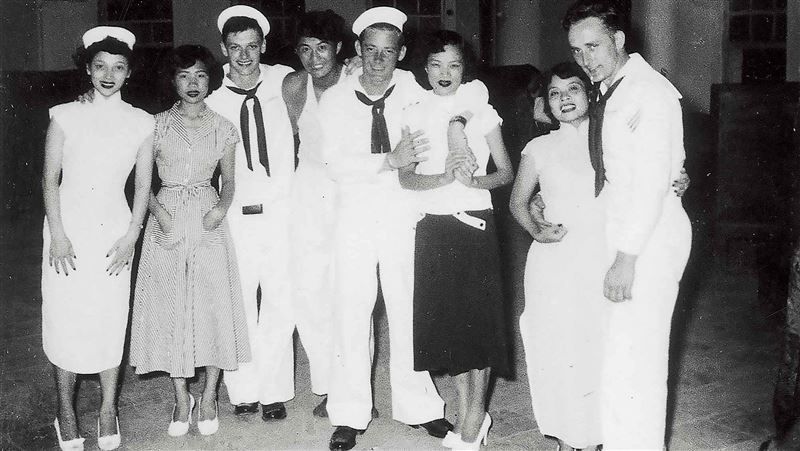
Jiao Tong's "Vietnam War Movie Filmed with Eyes" actually spanned the two periods of US aid (1951-1965) and the US military's full involvement in the Vietnam War (1964-1975). In 1950, the outbreak of the Korean War made the United States, which had intended to abandon Taiwan, suddenly realize the strategic position of this "orphan of Asia" in containing the "redization" of Northeast Asia. In the same year, the United States signed the "Common Security Act" to include Taiwan, Japan and South Korea in the scope of aid, and began a 15-year military and economic aid of 1.5 billion US dollars in the following year. In 1965, the US aid was officially suspended, and the Taiwan authorities fell into panic and sought various means of earning foreign exchange. At this time, the US military was caught in the swamp of the Vietnam War, and it also tried to let officers and soldiers boost morale through vacations. So the two hit it off, and the Kuomintang authorities took the lead to actively encourage the Vietnam War U.S. military to go to Taiwan for "sightseeing". Because Kaohsiung, where it is located, is often a landing port for the US military, and there are many dancers in the bars, it became a spring resort for the US military in the Vietnam War. This article also starts with two American elements that Taiwanese people had personal experience during this period—American aid food and American soldiers—to reveal Taiwanese people's perception and imagination of the United States during the Cold War.
American Time and American Money: The "America" Behind America's Aid Food
In "Crossing the Seven Sages and Three Roads", "underpants sewn from flour sacks aided by the United States" and "flooding into the church to receive bread" are common memories of Taiwanese people during the United States aid period, and they are mentioned in many memoirs and documentaries. In fact, the US aid flour bag is also used as children's underwear due to its high quality. So much so that many children's pants are printed with the words "Weighing 22 kg" (because the size of the US flour bag is 50 pounds), which makes people laugh.
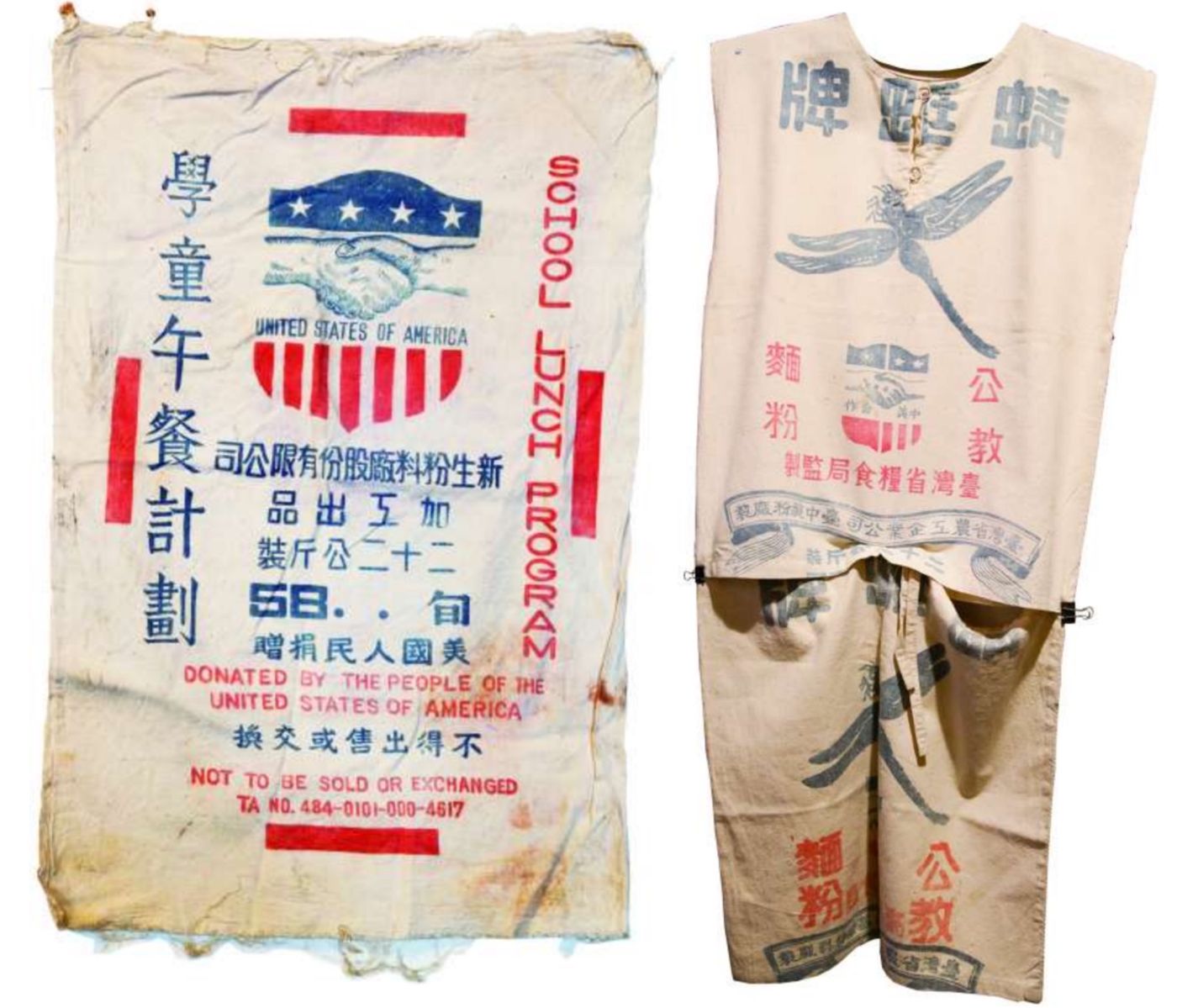
Coincidentally, before the reform and opening up, the mainland relied heavily on Japanese imports of urea. Therefore, the packaging bags of urea are also widely used to make clothes and trousers, which is exactly the same as the flour trousers in Taiwan.
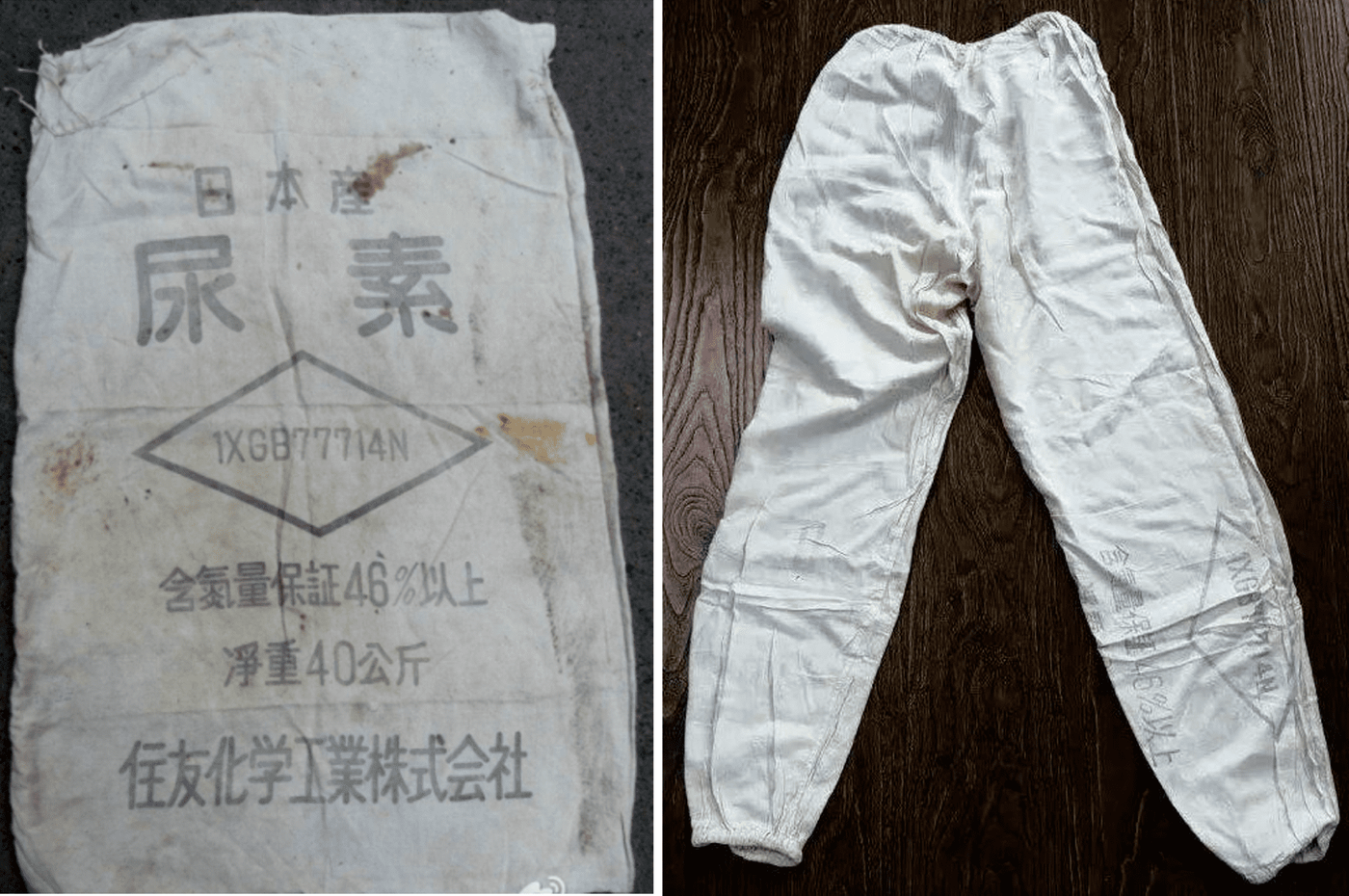
Strictly speaking, neither US aid flour bags nor free bread belong to the US aid plan for Taiwan that began in 1951. The 480 Public Law, which was signed by the United States in 1954, is called the "Development of Agricultural Trade and Assistance Act", and is in charge of the United States Department of Agriculture. However, it is still included in the US aid statistics, accounting for about 24% of the total aid. This bill has three main purposes. One is to alleviate the food shortage problem of US allies to maintain their rule. In addition to gifts, it also allows recipient countries to purchase American agricultural products in their own currencies with low credit; The main export to Taiwan is flour rather than rice, the staple food of Taiwanese; the third is to find and cultivate potential overseas markets for American agricultural products. It can be said that although it is called food aid, it includes many considerations such as politics, economic development and US overseas trade with the recipient countries and regions.
As far as Taiwan policy is concerned, this move is undoubtedly quite successful. The US-aided food not only relieved the food shortage in Taiwan, but also alleviated the overcapacity in the United States, and profoundly changed the dietary structure of the Taiwanese people, thus laying the foundation for Taiwan to import a large number of American agricultural products in the future. One of the most significant points is that the proportion of noodles in the staple food of Taiwanese has greatly increased. Because wheat is a temperate crop, it is not suitable for cultivation in tropical and subtropical Taiwan. Traditionally, Taiwanese seldom eat pasta. According to statistics, in the 1950s, Taiwan's per capita annual consumption of rice and sweet potatoes was 202 kilograms, while pasta was only 7.9 kilograms. In view of this, the United States-funded "China Rural Restoration Joint Committee (Rural Rehabilitation Association)" cooperated with the "U.S. Aid and Utilization Committee of the Executive Yuan" and the "Flour Industry Association" to establish the "Taiwan District Wheat Noodle Food Promotion Committee" in 1962. The committee not only promotes traditional Chinese pastries, but also cooperates with the American Wheat Association to train more than 100,000 Western bakers.
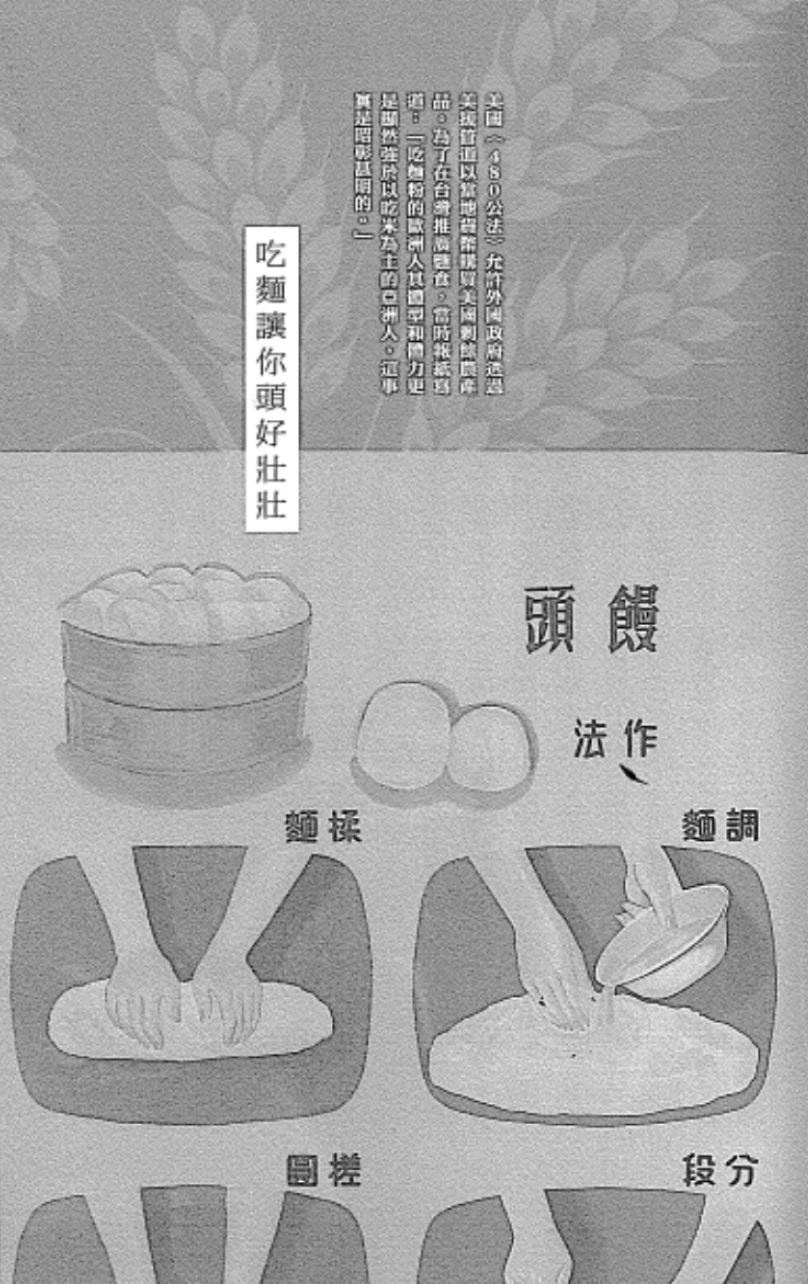
In addition, the United States also used the media to promote the public opinion that "noodles are healthy and rice is backward". For example, the "Harvest" magazine run by the American-backed "Nongfu Association" persuaded female friends to eat more pasta in the form of cartoons to have a "red complexion" and "white skin". Other newspapers and magazines followed suit with food-superiority theories such as "Northerners are taller than Southerners, and Europeans are taller than Asians because they eat more pasta." This argument is actually a deformed product of Eurocentric Teleology. The famous quote of Fujita Tian, the founder of McDonald's in Japan, is an extreme expression (US aid also promotes pasta in Japan): "The reason why the Japanese have short limbs, yellow faces and thin muscles is that they have only eaten fish and rice for two thousand years. If we continue to Eat McDonald's hamburgers and fries, and in a thousand years, we will grow taller, have whiter skin, and have blond hair on the top of our heads." Under the double offensive of this kind of material and public opinion, by 2014 Taiwan The COAG revealed that the annual per capita consumption of rice dropped to 44.96 kg (202 kg in the 1950s), while pasta rose to 36.14 kg (7.9 kg in the 1950s). Whether it is Chinese-style beef noodles, scallion pancakes, or Western-style bread and cakes, they have now become a business card of Taiwanese cuisine. In 2017-2018 alone, Taiwan imported 1.008 million tons of wheat from the United States. The United States' flour aid during the Cold War can be described as a grey line, and it has a long-term plan.
However, it is worth noting that, in addition to the social relief materials stipulated in Chapter 1 of the 480 Public Law by the USDA to the Taiwan authorities for distribution, the materials in Chapters 2 and 3 are "donated" to the Taiwan authorities by American church groups, and through Taiwan The National Catholic Welfare Committee (National Catholic Welfare Committee) and the Taiwan Christian Service (Taiwan Christian Service), two of the church groups, helped to issue the award, and the intention to spread the Christian faith is self-evident. However, compared with the impact of US aid on politics, economy and even eating habits, its ideological effect is hardly successful (today, the number of Christians in Taiwan only accounts for 4.5%, while in South Korea, which is also deeply influenced by the United States, its Christians are more up to 29.2%).
In view of the lack of detailed and express provisions on the distribution of relief items at that time, there was objectively a situation of internal misappropriation by the church. For example, on June 21, 1956, the Freshwater Presbyterian Church passed a resolution: "The amount of butter is small, so it is distributed to those in need." This made it impossible for ordinary townspeople to obtain the scarce butter. In such a context, going to church to listen to lectures or further "believing in religion" is not so much motivated by the charity of the religious group to help people, but rather a ticket for Taiwanese people to obtain relief materials. According to press records at the time, people jokingly referred to the Christian Church as "Eat Teaching", "Noodle Teaching" or "Flour Teaching". Although such slang terms are vulgar, they simply and rudely dispel the American religious propaganda behind the 480 public law relief, and restore the utilitarian attitude that ordinary people uphold when facing US aid. And the pragmatist view is best reflected by the writer Lin Wenyue, whose maid inadvertently said in a critical tone: " The people next door to my house are so greedy that they sent two people to believe in religion. "
It is in this context that the slang terms "American time" and "American money" came into being. Especially the former, there are still many people who use "I don't have much American time" as a mantra to express that they are busy. If you search for "no time in the United States" on the Internet, you can not only see the use of Taiwanese netizens in various contexts, but also some young people who are not sure about this language phenomenon: "Why do you often say when you are not free? 'There is no American time'?" The following answers are varied, such as "The United States and Taiwan have a 12-hour time difference", "Americans know how to enjoy leisure time", etc. Most of them have committed the anachronistic problem of historical discourse. They don't know that this slang term has been around since most Taiwanese people didn't even know what jet lag and US companies were. This also reflects the fact that, on the one hand, the vocabulary generated in the Cold War era still has tenacious vitality; The Cold War-tinged linguistic heritage continues to shape the Taiwanese imagination of America through an unconscious younger generation.
Published in 1988, the book "Walking Through the Past Together" reviewed the 40 years of development since the Kuomintang took over Taiwan, and pointed out the close connection between "American Time" and U.S. aid: " Since U.S. aid materials are all provided free of charge. Yes, so 'American time' and 'American money' were also developed in Hokkien, which is a metaphor for ridiculing that there is a lot of time, too much idleness, or too much money to waste. "
The "American time" and "American money" derived from free US aid materials reflect the "US" that represents inexhaustible abundance, but it alludes to the US government's use of US aid materials to clear its inventory. meaning. However, combined with the aforementioned term "flour religion", the United States has become a kind of big fool for people to "take nothing for nothing", which has produced a subtle deviation from the image of unity and friendliness it is trying to convey. This deviation reflects how the ideological vision planned by the United States through food aid is alienated by the simple and practical value judgments of the Taiwanese people at the receiving level.
During the same period, other Taiwanese slang words for "American" appeared. Taiwan introduced cauliflower (Cauliflower) from the mainland during the Japanese occupation period, and introduced broccoli (Broccoli) during the U.S. aid era (both are cabbage varieties, the former is white, the latter is green), so it is called " American cauliflower ", however, Its actual origin is Mexico. If it is excusable to say that "American cauliflower" originated from US aid, then " American potato " is somewhat absurd. "American potato" in Taiwanese refers to Malabar chestnut (Pachira macrocarpa), which originated in Central America and was introduced to Taiwan from Japan in the 1930s. It was later discovered that its sticky juice could be used in papermaking in the 1960s. The further packaging of landscape plants, also known as "fortune tree". Today, "Fortune Tree" has become an important export commodity of Taiwan, China, with an export value of NT$250 million in 2005 alone.
Regarding the "American potato", the "Taiwan Literature" statement is quite contradictory: "The Malabar chestnut is originally from Mexico, and it was originally a tropical fruit, because the seeds are edible after frying, and the fruit looks like peanuts, so It is also called 'American potatoes' (author's note: potatoes are peanuts in Taiwanese)." It seems that it is only right that the imported products from Mexico are called "American". "Taiwan Handicrafts" pointed out the relationship between the "Americanization" of Malabar chestnut and the Kuomintang - this infamous plant during the Japanese occupation period was called "American potato" almost overnight when the Kuomintang regained Taiwan. In 1992, a Central American talked about the mistake of "American potatoes" in "Lecture Hall": " Taiwanese people think that foreign countries are all 'American' and call them 'American potatoes'. I don't care about this wonderful misunderstanding. Because my home country, the Americas, is known for corruption. And the United States is respected and relied upon in Taiwan, so I have nothing against this kind of well-meaning misunderstanding. ”
In general, under the influence of American materials during the US aid period, the word "America" is close to the "Hu" of ancient "Hujia" and "carrot", and the "foreign" of modern "foreign music" and "foreigners". All Taiwanese imaginations about "foreign countries". This also foreshadows why "American joke" can be equated with "big joke" in the next section.
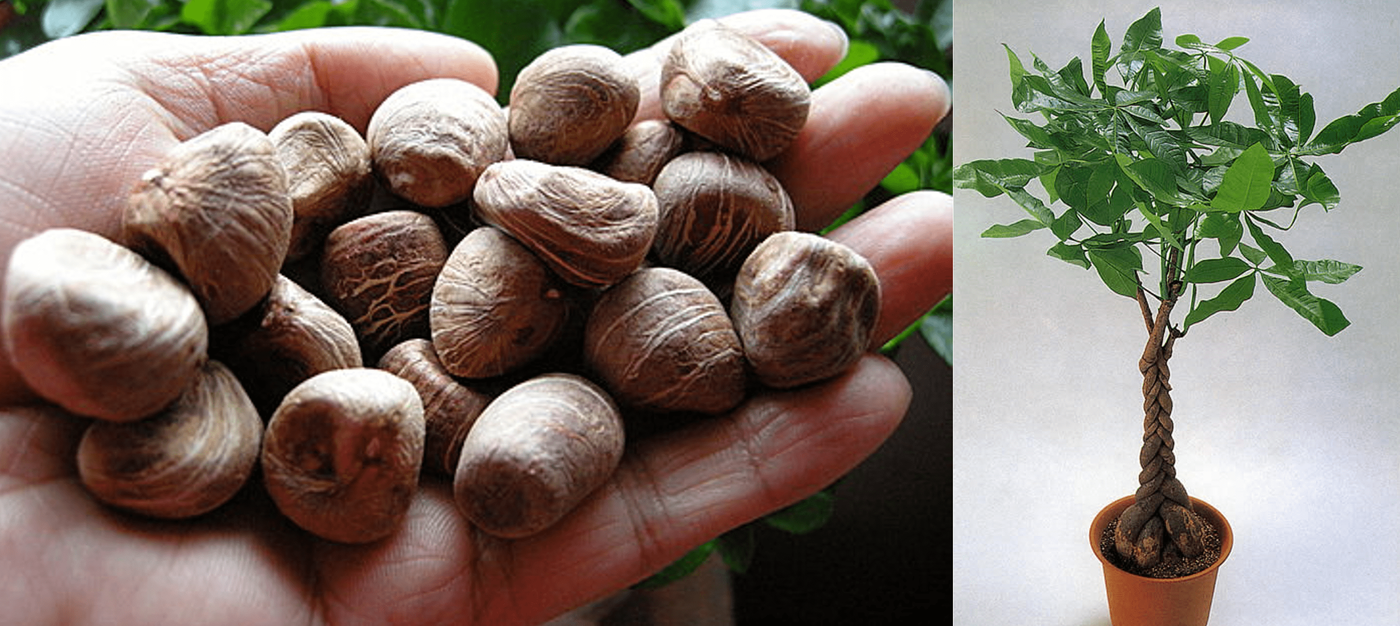
American jokes and American noses: behind the US military stationed in Taiwan is the big "America"
"What a joke about America!" As the name suggests, making a joke about America has serious consequences. In addition to the aforementioned "America" that carries the Taiwanese people's imagination of foreign countries, a more concrete and perceptible point is the extraterritoriality of the US military stationed in Taiwan.
In 1951, the United States had only 116 personnel stationed in Taiwan. By 1956, the US Pacific Command established the US Defense Command in Taipei, with more than 5,000 troops stationed and about 4,000 dependents, all enjoying diplomatic immunity. In Punishment and Power in the Making of Modern Japan , Daniel Botsman calls the Meiji-era extraterritorial rights of Western powers in Japan "in the name of human rights". the Imperialism of human rights. It is not difficult to imagine that the diplomatic immunity of nearly 10,000 people has brought huge hidden dangers to the security of Taiwan, and has provided an umbrella for the US military and their families to commit murder, rape and other vicious cases in Taiwan. The Taiwan authorities have no way to intervene because of extraterritoriality, which has aroused a strong backlash from the public.
The Liu Natural Incident that happened on May 24, 1957 was a rare event that triggered anti-Americanism among Taiwanese people. On March 20 of that year, Major Liu Ziran of the Kuomintang "Revolutionary Practice Research Institute" was shot and killed near the apartment of Sergeant Reynolds of the US Military Assistance Advisory Group. Because of Renault's diplomatic immunity, Taiwan authorities had to refer him to a US military court. Reynolds claimed that Liu Ziran committed suicide by peeking at his wife's bath. Although the Taipei Police Department pointed out that Reynolds' testimony was contradictory, the US military court still acquitted him two months later. On May 24, Liu Ziran's widow protested in front of the US embassy holding a Chinese-English placard that read "The Killer is innocent? I protest! I accuse! The Killer Reynolds is innocent? Protest against US court martial, is unfair, unjust decision!" . At 12 noon, a reporter from the Kuomintang Party Media China Broadcasting Corporation started an interview, attracting crowds to gather. By 2:30 in the afternoon, the number of people had increased to 6,000, shouting "Kill your life" and "Down with imperialism", and started attacking the "U.S. Embassy" with stones and bricks, and climbed over the wall to enter. Crowds smashed cars, furniture, burned documents, and beat embassy personnel in the "US embassy", throwing it into chaos for ten hours.
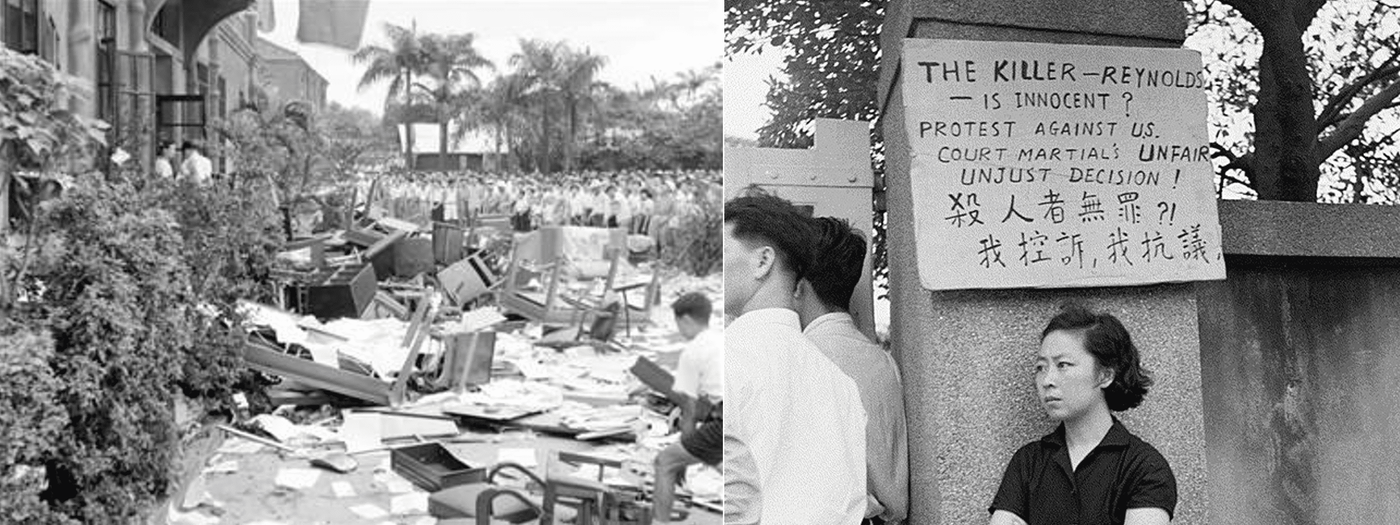
Although American investigators suspect that the incident was not purely a public riot, but was related to Chiang Ching-kuo's incitement, it is undeniable that this action was broadcast live by China Broadcasting Corporation, which caused a huge impact on Taiwanese people's perception of the United States, which is reflected to a certain extent. Anti-American sentiment among the people under extraterritorial jurisdiction. Six years later, in 1963, Xu Tingze, a captain and pilot of the Kuomintang, defected to the mainland by plane, was personally received by the commander-in-chief of the Air Force Liu Yalou and was awarded the rank of major. Xu claimed that the main reason for his surrender was his dissatisfaction with the fact that Tom, an American consultant, raped the wife of an Air Force captain, but no one cared about it. Xu said with emotion:
I'm like a watchdog for those people, with no human rights, and it's up to them to act.
The public resentment aroused by the extraterritorial power of the US military is evident. In 1965, Taiwan and the United States signed the Agreement on the Status of U.S. Armed Forces in China, and Taiwan took back its extraterritorial rights to a limited extent. However, cases of rape and murder of Taiwanese women by the U.S. military continued to emerge in an endless stream, and the Taiwan authorities still mostly left things alone with a calm attitude. For example, in the 1967 U.S. Army Corporal Rafi rape case of a woman surnamed Xu Ba, it was stipulated in the "Status of the U.S. Armed Forces in China" that "if the U.S. military commits a crime of injury in Taiwan, it is a case of abandoning its jurisdiction, and the court cannot prosecute it", and The prisoner claimed to be "unconscious" and was acquitted on this ground. In 1973, Corporal Robinson of the US Army raped and killed a woman named Lei Bar, the evidence was conclusive, but he was only sentenced to five years in prison. This is still taking into account that "the defendant Robinson was depressed because he worked on the ocean for many years...it can be forgiven...the punishment is reduced by half according to law", which can be described as comical. In 1972, the case of U.S. Army Corporal Lutz who tortured and killed a woman named Lin Ba was even more ironic. Taichung District Court, for the sake of peace of mind, sentenced him to one year and six months in prison for only negligent death. But Luz refused to accept it and proposed that the US re-examine the evidence. The U.S. side's result was the same as that of the Taiwan side, and its punishment was changed to homicide and sentenced to five years in prison. All of the above-mentioned cases aroused great public grievances, and the results of the review were also known to the public through newspapers.
Although some scholars pointed out that during the Cold War, the United States Information Service spared no expense in subsidizing Taiwan scholars to translate and publish anti-communist and pro-American literature, which has far-reaching significance to Taiwan's literary history. But as far as ordinary people in Taiwan are concerned, these literary works are probably far less eye-catching than the lurid vicious cases in the press. In fact, Taiwanese people do not need to understand the arrogant academic terms such as "postcolonialism", "extraterritoriality", and "modernity". As long as they compare the crimes committed by US soldiers and their punishments in newspapers and magazines, it is not difficult to find out A deafening "truth": Americans can't afford to offend, what a joke about the United States!
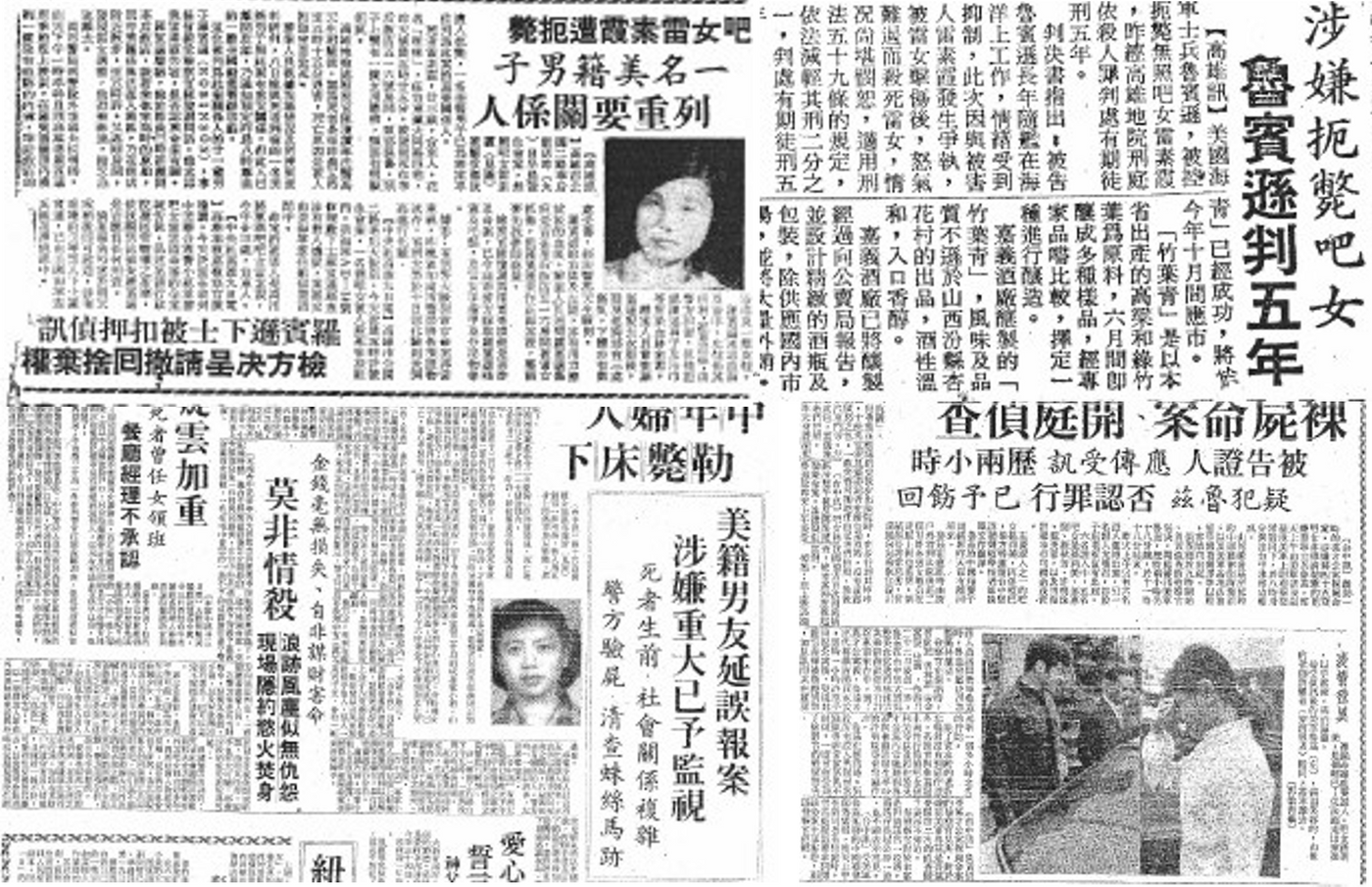
The three murdered women above were all women in the porn industry, and most of the murderers were American soldiers in the Vietnam War. This is exactly the time when the Vietnam War U.S. military came to Taiwan for vacation, and "poor women earn foreign exchange for the hungry government" described in "Three Ways of the Seven Sages". In order to boost morale, in addition to 30 days of vacation each year, the Vietnamese military also enjoys an additional five-day vacation in Asia, called the Rest and Recuperation program. During these 5 days, each officer and soldier will have 200 US dollars for consumption in Taiwan, Hong Kong or Japan and South Korea. Considering that the monthly salary of middle-level civil servants in Taiwan at that time was less than 25 US dollars, the consumption of these American soldiers to buy spring is undoubtedly a double-meaning "American money". Therefore, the Taiwan authorities, which have been in urgent need of foreign exchange since the end of the US aid in 1965, are willing to refuse and welcome the US military vacation to buy spring. Wang Meixiang pointed out that although the "Taiwan Tourism Investigation Report" stated that the U.S. Department of Defense "designated" Taiwan as a vacation area for the U.S. military, the meeting materials of Defense Department officials revealed that the Taiwan authorities have been writing letters asking the U.S. military to come and take a vacation. In order to increase the attractiveness, the Taiwan authorities even held a lottery for the US troops coming to Taiwan, and the winners could enjoy a free five-day tour around Taiwan. According to statistics, in the five years from 1965 to 1970 alone, about 200,000 US troops came to Taiwan, contributing more than NT$1 billion in consumption. However, in such an unspoken "reinforcement" transaction, the 1967 Time Magazine article titled "Five Day Bonanza" stabbed a hornet's nest and made Chiang Kai-shek furious. Zhang introduces the beautiful photos of his trip to Taiwan.
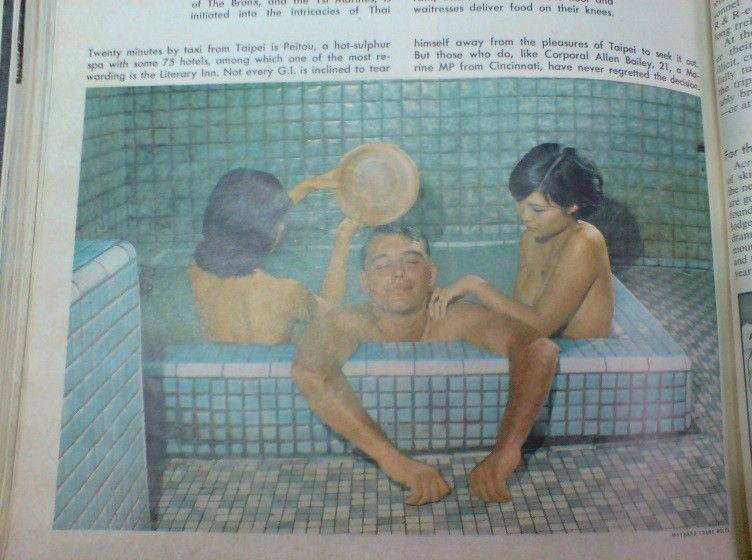
As the name suggests, the "Five-Day Lucky Trip" refers to the five-day Asian vacation of the US military, which can freely travel to Vietnam, Japan (Tokyo, Kyoto), Taipei, Bangkok, Hong Kong, Honolulu, Manila, Kuala Lumpur, Sydney and other cities. There are only two paragraphs in the text that mention Taiwan, namely:
Taipei, which has few cultural monuments apart from the great collection of Chinese art in the National Museum, has gained R & R status from the complaisance of its girls and the excellence of its food. Taipei's cultural landscape is lackluster, but it is favored by the "rest and recovery plan" for its docile girls and delicious food.)
Keep out of the buses or you may lose your wallet. Do not purchase the company of a girl for more than 24 hours at a time; they seldom look as good in the morning. And don't exceed 24 hours at a time, because they often wake up in the morning with different looks.)
It can be seen from "Time Magazine" that Taipei has almost nothing to do except buy spring. The introduction to this explicit image is equally ambiguous:
Twenty minutes by taxi from Taipei is Peitou, a hot sulphur spa with some 75 hotels, among which one of the most rewarding is the Literary Inn. Not every GI is inclined to tear himself away from the pleasure of Taipei to seek it out. But those who do, like Corporal Allen Bailey, 21, a Marine MP from Cincinnati, have never regretted the decision. Most worth a visit. Not all US soldiers are willing to escape from the gentle village of Taipei to find out. But including 21-year-old Marine Corps squad leader Alan Bailey from Cincinnati, no one has been to Wenshi Court. regret.)
There are two reasons for Chiang Kai-shek's anger. First, in order to fight the Cultural Revolution, Taiwan is holding a "Chinese Cultural Revival Movement"; It is too embarrassing for "poor women to earn foreign exchange for a hungry country" under the emperor's feet. Public opinion also continued to ferment, calling for the banning of Time Magazine. The Taiwan authorities could only evade the importance of condemning the photos as "indecent", but promised that "the import of the magazine will not take any retaliatory measures." Ironically, when the Taiwan authorities tried to use the two waitresses as scapegoats, they He was strongly protested by the photographer Andrew, who bluntly said that he was willing to go to jail on his behalf. In desperation, the Taiwan authorities had to order Andrew to leave the country, only to announce that Wenshi Court was closed for a week on the crime of blatant indecent assault, and handed over the waitress Meiling to justice. Although Sister Meiling was ultimately not prosecuted, the case was abuzz throughout Taiwan, and the public felt the humility of the authorities in front of the United States. Not only Time Magazine couldn't stop it, but the hero of the photo, Alan Bailey, stayed out of the matter, and even American photographers It can also make the authorities have no choice but to use innocent waiters in the end.
Columnist Mrs. Wei Wei's article "Upside Down Black and White" can quite represent the helplessness and anger of the Taiwanese people over this matter: " Reading this news makes people feel like crying but not laughing. The incident happened... So I have to do something for everyone to see. The only way is to arrest a few people to take the blame. Who is best to mess with? Of course, pick the best bully and the weakest. Do things that hinder diplomatic relations. No... who's left? The woman who was photographed. "
Of course, it wasn't all scandalous scandals that came with the GIs. Americans, with their tall nose bridges and burly bodies, constitute the third meaning of the adjective "America": tall and gigantic. In Taiwanese, American nose (big nose), American second child (majestic phallus), and American suit (this is an afterword, because Americans are larger in size, Taiwanese take the homonym "big loss" for "big body", that is Big defeat, loss and loss) and other words. These slang terms not only use the "big" of "America" to achieve a joking effect, but also in turn become part of Taiwanese people's imagination of the United States. For example, "American nose", in addition to having a big nose, has also become a symbol of "Americanness". For example, on December 1, 2013, "United Daily News" reported that an American nun won an award at the Immigration Festival in Chiayi City. The title is: : "I am from Chiayi, with an American nose, and a Taiwanese heart." In "Three Ways to Pass the Seven Sages", "the semen that makes waves like the Seventh Fleet. The penis of first-class combat readiness will have an erection when it is killed." Although the words are sarcastic, But it also coincides with the stereotype of "American second child".
In general, re-examining the image of the word "America" in slang terms from the perspective of the US military stationed in Taiwan can be called "this is a big deal". This big is not only huge in scale (American nose), but also in degree (American joke). This constitutes another dimension of the Taiwanese people's imagination of "America".
Remainder
Taking the United States in Taiwanese slang during the Cold War as an example, this article attempts to analyze the Taiwanese people's imagination of the United States through a bottom-up approach. Why look for the voice of the people outside of elite discourse? This is because the latter are often silent. Even if Jiao Tong wrote a poem about his "Vietnam War movie filmed with the eyes of his youth", he may not be able to speak.
This is not the author's alarmist. In fact, the poem "Crossing the Seven Sages Three Roads" was included in the Kaohsiung Municipal Nanzi National High School as the material for the history examination paper (Kaohsiung is Jiao Tong's hometown and the location of the Seven Sages Three Roads). The last question makes people laugh and cry:

The questioner deliberately replaced the question from "How did the women in poetry earn foreign exchange" with "How did the women of that era earn foreign exchange", and provided four fairly "decent" answers. Ironically, none of these answers have anything to do with the poet's grief. Even if Jiao Tong tried to open up a corner of the "exotic blues" of that era, the historical test paper covered it lightly. What's more, how many ordinary people who can't even leave words are buried in the dust of history?
I think that's what it means to write history for the voice of the people.
Like my work?
Don't forget to support or like, so I know you are with me..
Comment…